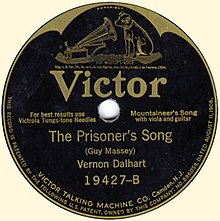National jukebox
The National Jukebox ( English for The National Jukebox is) a project of the US National Library for archiving and publication of historical recordings. When it was launched in May 2011, the collection comprised around 10,000 titles from the years 1900–1925 by the Victor Talking Machine Company , mainly with music, but also spoken word, including German, Italian and Yiddish. All recordings, on average 2½ minutes long, can be played back via the library's internet portal.
history
The creation of the National Jukebox goes back to the success of a project by the University of California at Santa Barbara UCSB in 2006. At that time, UCSB had started to make thousands of original sounds recorded on Edison cylinders available free of charge on its website. This "cylinder preservation" portal was seen as a signal and model for the opening of libraries worldwide and received several awards.
The 5000 records from the Victor label, which the Library of Congress digitized and acoustically and bibliographically prepared for the web in the course of 2010, also come from the collection in Santa Barbara. The reason for starting the National Jukebox with these discs in May 2011 was that the Victor collection was not only completely and completely indexed, but many discs were even available twice. The studio technicians in Washington often undertook minimally invasive interventions when digitizing the records, which played at 78 revolutions per minute. In some cases, they apparently adjusted the wrong pitches and removed scratches where possible. The Library of Congress had the front and back of the records scanned and made these photos available through the National Jukebox's web portal, along with an extensive search function by title, year, genre, etc.
Current inventory
The titles include pieces of music typical of the beginning of the 20th century such as Gaetano Donizetti's “Serenata”, sung by Enrico Caruso on February 27, 1905, or the ragtime “Boll weevil blues” by the International Novelty Orchestra with Vernon Dalhart , recorded on August 8, 1924, also comedic scenes (e.g. the German war radio play "Outpost on the Italian Border" by Julius Salay, August 11, 1916) and speeches by American presidents and presidential candidates from the period (e.g. a short Address by William Howard Taft on the initiation of equal rights for black citizens "Rights and progress of the Negro" on August 5, 1908).
Most of these historical audio productions are not in the public domain but are copyrighted by Sony Music Entertainment . The special agreement with Sony allows visitors to the National Jukebox website to listen to ( stream ) the works directly , but explicitly forbids downloading and saving them.
The Library of Congress has now digitized 3,000 more titles by Victor and is now in the process of signing contracts for other historical record labels such as Columbia , Okeh (with works of early American blues and jazz) and Berlin to have their historical recordings with the National Bring jukebox online.
Web links
- Library of Congress: National Jukebox
- Radio report on the National Jukebox on WDR 3 on May 30, 2011
Individual evidence
- ↑ Sound recordings on the Internet portal of the American National Library (English)
- ↑ Website with recordings on Edison wax rollers at the University of California, Santa Barbara (English)
- ↑ Among other things, the American TIME Magazine in 2008 named the UCSB's Cylinder Preservation Project one of the 50 best websites.
- ↑ The Berliner Gramophone ( Link to the English Wikipedia ) was considered the first record company ever, founded in 1895 by Emil Berliner ; In 1898 Emil Berliner and his brother Josef founded Deutsche Grammophon in Hanover .
